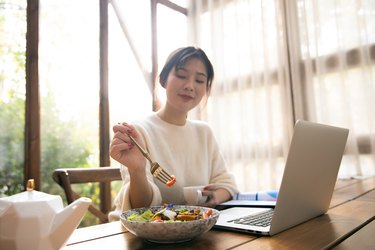
If you have diabetes, sugar-free foods can be a part of a healthy diet, but just because a food is "sugar free" doesn't mean it won't affect your disease. Here's what you need to know about sugar-free food if you have diabetes and want to stay healthy.
Read more: A List of Foods That Do Not Contain Sugar
Video of the Day
Video of the Day
Diabetes, Sugar and Carbohydrates
Diabetes occurs when your body cannot make or properly use the hormone insulin, which is tasked with moving blood sugar from your blood into your cells for energy, explains the National Institute of Diabetes and Digestive and Kidney Diseases (NIDDK). When insulin can't do its job, blood sugar stays put, and if levels remain too high over time, diabetes-related complications can occur, including vision problems, kidney damage and heart disease, the institute notes.
Carbohydrates become sugar, so eating carbs leads to higher levels of blood sugar. Simple carbohydrates or simple sugars include fructose, glucose and lactose, while complex carbohydrates are starches like rice, pasta and bread.
Some sugar-free foods or sugar substitutes also contain carbs, which is why it's important to read labels carefully, according to the Cleveland Clinic. And, despite its name, sugar doesn't raise blood sugar any more than starches do, the Cleveland Clinic notes.
For these reasons, some people with diabetes count carbs as a way of keeping their blood sugar where it needs to be. One carbohydrate portion equals about 15 grams of carbohydrates, according to the Centers for Disease Control and Prevention (CDC). Others may adhere to the glycemic index, a scale that ranks how quickly (or slowly) carbohydrates affect your blood-sugar levels, the CDC points out.
Understanding Sugar-Free Foods
The only foods that have no sugar are animal proteins such as chicken, fish, eggs, cheese, red meat and fats such as oils, explains Leigh Tracy, RD, LDN, a dietitian and diabetes educator at the Center for Endocrinology at Mercy Medical Center in Baltimore.
There's no such thing as a sugar-free vegetable, she adds. "All vegetables have some amount of carbohydrates, which breaks down into sugar in the body," Tracy says. "Non-starchy vegetables such as leafy greens, tomatoes, zucchini, onions and green beans have the least amount of carbohydrates."
Vegetables are an important part of a healthy diet, and the American Diabetes Association suggests aiming for at least three to five servings of vegetables a day.
All fruits contain sugars, too, even the bitter ones like grapefruit, says Maria E. Rodriguez, RD, CDE, a dietitian and certified diabetes educator with the Mount Sinai Health System in New York City and program manager for the Mount Sinai Diabetes Alliance.
You can and should still eat fruit, as long as you keep track of portions, Rodriguez says. "The important takeaway is knowing what is a serving of fruit," she says. "One small apple is equal to 15 grapes, one-half of a banana or 1 cup of berries."
Berries have fewer carbohydrates per cup than fruits such as pineapple, bananas and mango, Tracy adds.
They may not be any more deleterious on your blood sugar, but foods that are high in sugar are often high in fat and calories, too, potentially leading to weight gain. Diabetes and obesity tend to travel together and are considered major risks for heart disease, but maintaining a normal weight can help reduce this risk, says the NIDDK.
Smart Snacking
Thinking of a healthy snack that's low in sugar and other carbs? Rodriguez suggests these super-healthy, low-carb snacks with less than 5 grams of carbs each:
- 15 almonds.
- 3 celery sticks + 1 tablespoon of peanut butter.
- 5 baby carrots.
- 5 cherry tomatoes + 1 tablespoon ranch dressing.
- 1 hard-boiled egg.
- 1 cup cucumber slices + 1 tablespoon ranch dressing.
- 1/4 cup of fresh blueberries.
- 1 cup of salad greens + 1/2 cup of diced cucumber + drizzle of vinegar and oil.
- 1 sugar-free ice pop.
- 1 cup of light popcorn.
- 2 saltine crackers.
- 10 goldfish crackers.
- 1/2 cup sugar-free gelatin.
- 1 piece of string cheese stick.
- 8 green olives.
- 2 tablespoons pumpkin or sesame seeds.
- 1/4 of a whole avocado.
Read more: A No-Added Sugars Diet Plan
- National Institute of Diabetes and Digestive and Kidney Diseases: “What Is Diabetes?”
- National Institute of Diabetes and Digestive and Kidney Diseases: “Diabetes, Heart Disease, and Stroke”
- Cleveland Clinic: “Is Sugar-Free Candy the Best Choice If You Have Diabetes?”
- Cleveland Clinic: Carbohydrates & Blood Sugar Control for People With Diabetes”
- CDC: “Diabetes Meal Planning”
- Leigh Tracy, RD, LDN, CDE, dietitian, nutritionist, diabetes educator, Center for Endocrinology, Mercy Medical Center, Baltimore
- American Diabetes Association: “Non-Starchy Vegetables”
- Maria E. Rodriguez, RD, CDE, dietitian, certified diabetes educator, Mount Sinai Health System; program manager, Mount Sinai Diabetes Alliance, New York, New York
- Centers for Disease Control and Prevention: "Carbohydrate Choice Lists"
Is this an emergency? If you are experiencing serious medical symptoms, please see the National Library of Medicine’s list of signs you need emergency medical attention or call 911.